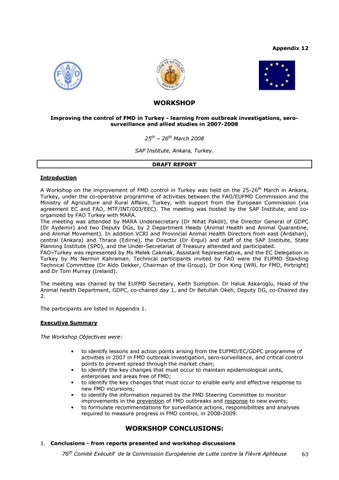Appendix 12
WORKSHOP Improving the control of FMD in Turkey - learning from outbreak investigations, serosurveillance and allied studies in 2007-2008
25th – 26th March 2008 SAP Institute, Ankara, Turkey. DRAFT REPORT Introduction A Workshop on the improvement of FMD control in Turkey was held on the 25-26th March in Ankara, Turkey, under the co-operative programme of activities between the FAO/EUFMD Commission and the Ministry of Agriculture and Rural Affairs, Turkey, with support from the European Commission (via agreement EC and FAO, MTF/INT/003/EEC). The meeting was hosted by the SAP Institute, and coorganized by FAO Turkey with MARA. The meeting was attended by MARA Undersecretary (Dr Nihat Pakdil), the Director General of GDPC (Dr Aydemir) and two Deputy DGs, by 2 Department Heads (Animal Health and Animal Quarantine, and Animal Movement). In addition VCRI and Provincial Animal Health Directors from east (Ardahan), central (Ankara) and Thrace (Edirne), the Director (Dr Ergul) and staff of the SAP Institute, State Planning Institute (SPO), and the Under-Secretariat of Treasury attended and participated. FAO–Turkey was represented by Ms Melek Cakmak, Assistant Representative, and the EC Delegation in Turkey by Ms Nermin Kahraman. Technical participants invited by FAO were the EUFMD Standing Technical Committee (Dr Aldo Dekker, Chairman of the Group), Dr Don King (WRL for FMD, Pirbright) and Dr Tom Murray (Ireland). The meeting was chaired by the EUFMD Secretary, Keith Sumption. Dr Haluk Askaroglu, Head of the Animal health Department, GDPC, co-chaired day 1, and Dr Betullah Okeh, Deputy DG, co-Chaired day 2. The participants are listed in Appendix 1. Executive Summary
The Workshop Objectives were: •
• • • •
to identify lessons and action points arising from the EUFMD/EC/GDPC programme of activities in 2007 in FMD outbreak investigation, sero-surveillance, and critical control points to prevent spread through the market chain; to identify the key changes that must occur to maintain epidemiological units, enterprises and areas free of FMD; to identify the key changes that must occur to enable early and effective response to new FMD incursions; to identify the information required by the FMD Steering Committee to monitor improvements in the prevention of FMD outbreaks and response to new events; to formulate recommendations for surveillance actions, responsibilities and analyses required to measure progress in FMD control, in 2008-2009.
WORKSHOP CONCLUSIONS: 1.
Conclusions - from reports presented and workshop discussions
76th Comité Exécutif de la Commission Européenne de Lutte contre la Fièvre Aphteuse
63




